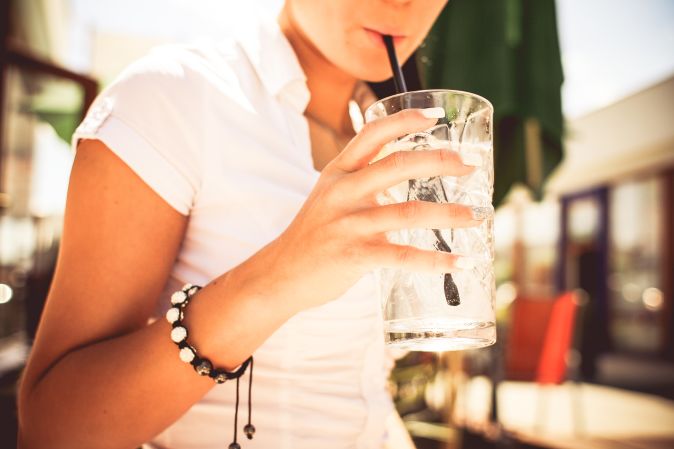
Pet grief can be all consuming in more ways than one. The sadness we feel can lead us to find comfort in sometimes the least healthy ways. We eat our sadness - yes, even after the loss of a pet. Increased food consumption can go lock and step with the mourning process.
Following the deaths of both Tia and Spartacus, I turned a lot to food as a form of comfort. While I know that some people lose their appetites and have no use for food following the loss of loved ones, that isn't me. I crave sweets. I don’t even know if it was hunger so much as that momentary rush of sugar that gave me a little lift. From cookies to candies to eggnog, if it was sweet, that’s all I wanted. I just felt better when I had a piece of toffee to nosh on and get me through my depression.
I wasn’t feeling so great when I stood on the scale come a few weeks later, though. In fact, my pants were quite snug. This only made the depression and grief worse.
It's easy to develop a love affair with food and drink, be it sweet delights, savoury snacks, or boozy concoctions that help us get by - but this has big repercussions. Let’s dive into how to avoid a grief-driven binge fest.
Understanding Grief Overindulgences
There are multiple reasons we feel the need to gorge ourselves during periods of grief and loss. We need to strive to understand why we eat more when we’re sad or depressed - doing so helps us become more mindful of our food consumption and stay healthy even during challenging times. So let's first look at a few ways that food speaks to our grief.
Food Equals Comfort
Think about it---our fondest memories in life are usually tied to favourite foods. Grandma’s lasagna, Mom’s stuffing at Thanksgiving, funnel cakes from the fair, and so many other tasty treats - they all bring back the good memories. We reach for them when we’re feeling sad as a way to stoke a sense of happier times.
Hopelessness Equals a Need for Food
Losing a furry (or smooth-skinned) friend can be reason for despair. Nothing really matters anymore. We don’t really care about our looks or health at that point, so we just reach for that extra piece of cake. Food is our new best friend.
Our Brain Chemistry Drives Eating
We want to feel better. The reward centers of our brains are triggered by delicious, yet unhealthy foods, like those that are laden with fat or sugar. When we start to indulge, our feel-good neurotransmitters start to fire. Our dopamine levels rise. As a result, we keep eating, and eating, and eating.
Fatty Foods May Help
The fat in fried foods and buttery delicacies might actually make us less sad. In a University of Leuven (Belgium) study, two groups viewed sad images and listened to sad music while undergoing an MRI. Fats were injected into the stomachs of one group, while the other group received a placebo. The results showed the group that received fats had significantly less sadness.
We Don't Want to Cook When We’re Sad
Not me. It’s enough to get up and move when I’m in mourning or even depressed. It’s much easier to phone in for a pizza and bread sticks combo or pick up some Chinese food. It tastes better, too.
We’ve Earned It
Food as a reward is learned behaviour. When we’ve had a tough day, we’re more likely to treat ourselves to some favourite snacks or a scrumptious dinner with a big bottle of wine. After all we’re going through, don’t we deserve a treat ... or twenty?
We’re Bored
Even when we’re not in the midst of mourning, it’s easy to snack out of sheer boredom. I can’t begin to tell you how many times I’ve been not-so-hungry but still looked for something to do, and as a result turned to the fridge for entertainment.
It’s Sitting Right There
Perhaps a friend dropped by to share in your sorrow and brought along a coffee cake or a batch of cookies. There's a bakery just around the corner from our house, and so it kinda was "just there" - across the parking lot and down the street. It was easy to grab two or three of some kind of treat on a moment's notice. Once I started, it was hard to stop. Often the take-home bag was much fuller than I'd intended it to be.
Phew, that was a lot of confession on my part - many of my guiltiest habits. How about you? What do you crave when you're less than emotionally upbeat and happy?
And now that we recognize WHY we’re so addicted to food, let’s look at how we can move past it and deal with our grief in less food-focused ways.
How to Stop Grief Eating
Yes, you can do it. Here’s how:
Ask Yourself If You’re Really Hungry
Before reaching for a second cookie or foraging through the fridge for a snack, ask “Am I actually hungry?” Too often, we get into an autopilot routine, especially when we’re eating out of grief. By stopping to assess our actual need for food versus habit, it’s easier to put the brakes on our food consumption.
Know Your Triggers
Let’s face it. We all have Pavlovian triggers when it comes to food. To move past the pattern of overeating, we need to identify when, what, where, and why we’re reaching for the entire tub of Haagen Dazs or carton of Oreos or bag of chips. One way to track our eating practices is to keep a journal handy.
Practice Mindful Eating
Have you ever noticed that sometimes you just eat food and don’t even notice what you’re putting in your mouth? I know I do. Mindful eating means paying attention to what goes in our mouths in terms of savouring the textures and tastes. When we strive to eat slowly and enjoy our food, we eat less and appreciate it more. We've got a lot more info on this subject in this article on using mindful eating apps when mourning to avoid weight gain.
Find Alternatives to Eating
Rather than running to the cabinets and picking up a handful of chips to go with a second glass of wine, take a moment and breathe deeply, especially if anxiety is at the root of this urge. Doing some gentle exercise like yoga or going for a mindful walk or spending time in nature are all good alternatives too. A warm mug of tea can be both soothing and lessen the urge to eat.
Focus on Dealing With Tough Emotions
Working through emotions, such as pet grief, can help with healing. Find ways to express yourself, whether through a journal, photography, and taking a long bath and crying if need be. More importantly, discover a pet loss support group or grief counselor who can help you process your emotions and develop healthy healing mechanisms.
Understand the Grief-Boredom Connection
When we lose someone special like a pet, it alters our routine and leaves gaps of time during which we once shared time together. Combine that with being more homebound and depressed than usual and you have the perfect receipt for boredom. What happens when we’re bored? We eat. Fight the boredom by doing something different, like taking a yoga or spin class, riding a bike, reading, or even venturing to a museum or some place new.
Discover New Joys
Grief sucks the happiness out of our lives. Food becomes the comfort because it’s pleasing to us. If you identify with this, it might be time to try something different. Take a community education class or find a volunteer activity that you might enjoy.
- Avoid Eating while Watching TV: Of course, watching something on TV can be a great distraction. However, if you are prone to snacking mindlessly during viewing times, you might be eating more than you realize. If you really need a snack, try measured portions and healthy options.
- Limit Carry-out to Once a Week or Less: If you’ve gotten into a habit of ordering food every night because you’re too sad to cook, it might be time to wean off that habit. Have groceries delivered or ask a friend to help you. Online meal delivery services like Hello Fresh can take some of the stress off thinking about what to cook.
- Treat Yourself: Don’t deprive yourself of all loved foods when you’re grieving. Instead, indulge more sporadically as you try to get your eating practices back in line.
- It’s OK to Get Help: Remember, if grief becomes all consuming in many ways, including overeating, it might be time to seek counseling. Think of it as retraining your mind to cope in healthier ways.
For me, the struggle to eat well and maintain my body weight as I process my grief over the loss of my cats is ongoing. The feelings of loss certainly didn't just disappear after a few weeks - they come back like waves and remind me of the sadness, and that puts me back on the roller coaster of poor eating. But I'm working at it and this appraoch to my relationship with food is part of the solution. Let me know what works for you!
Images: Brooke Lark, Viktor Hanecek, Kate Remmer
Affiliate Disclosure: There may be affiliate links on this page which help to pay for Tiny Pet Memories. If you make a purchase through a link I provide, thank you because it may allow me to earn a small commission at no additional cost to you. I am not paid to promote specific products. Any opinions I express are strictly my own.
Health Disclaimer: I’m passionate about wellbeing and health but I’m not a medical professional, nor am I a licensed therapist. Any content you read on this site is intended for inspiration and for information only – by not means am I providing medical advice. Please consult your certified professional for personalized recommendations on the mental health or physical health ideas I write about.


